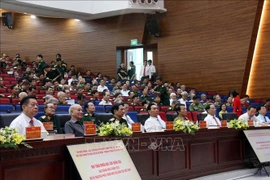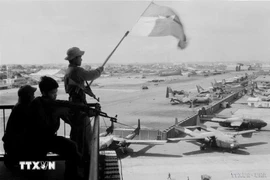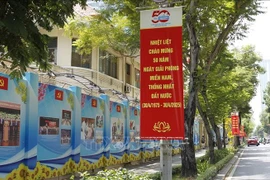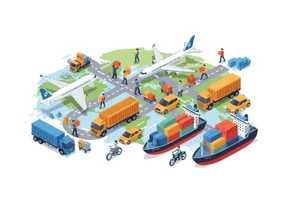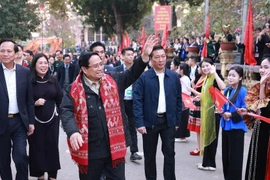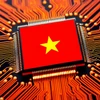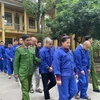Moscow (VNA) – During its fight for independence and freedom, Vietnam brought together all the strengths essential for the victory 50 years ago, said a member of the board of trustees of the Soviet Peace Fund.
Talking to Vietnam News Agency correspondents in Russia, Viktor Petrov, who was also a member of the Soviet Union’s committee for supporting Vietnam, elaborated that those factors included the clear-sighted leadership of the Party, the genius of the country's leaders, a wise diplomatic strategy, skilled negotiators, the national unity, a capable army, and strong support from the international community.
He stressed that Vietnam’s unrecognisable achievements and changes today are entirely justified when the Vietnamese people managed to secure those strengths.
He shared that what struck him most was the strength of Vietnam during the struggle and the way every Vietnamese came together and drew upon their collective power to reach the final goal – the reunification of the country, the reunion of families, and peace for their homeland.
With a background in international relations and strong proficiency in French, Petrov was assigned to handle Vietnam-related matters at the Soviet Union’s committee for supporting Vietnam during 1972–1973, when the peace negotiations entered the challenging final stage. The committee was responsible for assisting delegations from South Vietnam.
Working directly with Vietnamese delegations, Petrov witnessed the final phase of the negotiations, when the two sides engaged in moment-by-moment battles of wits to defend and push their agendas toward a final outcome. The US and Western powers did not want to be in failure in South Vietnam, and sought to prevent the reunification of the country’s two regions following the 1973 Paris Peace Accords.
He noted that negotiating with an opponent gripped by fear and fully aware of its impending defeat created an extremely challenging context for Vietnam.
He said that he could not remember how many times he had welcomed and seen off renowned diplomat Nguyen Thi Binh, head of the delegation of the National Front for the Liberation of South Vietnam and then the Provisional Revolutionary Government of the Republic of South Vietnam, during her negotiation and advocacy visits to Moscow. She was also one of the persons signing the 1973 Paris Agreement and the only woman among them. Petrov was impressed by her fluency in French, busy schedules, and tireless efforts.
The Soviet Union’s committee for supporting Vietnam brought together representatives from various professions, including many famous persons and those with financial resources and wide relationships, who effectively leveraged their influence and capacity to support Vietnam, Petrov noted.
The committee's task was not to call for support for Vietnam in the Soviet Union because supporting Vietnam was already a widespread movement in the Soviet Union at that time, but it is responsible for advocating support from other countries such as Sweden and France. Facing hardships of the war, activities of Vietnam’s peace negotiation delegations abroad would have been much harder without the strong support from the Soviet Union, as well as political friends in France, Sweden, and other countries, according to him.
Petrov emotionally recalled the moment when he delivered the news of victory on April 30, 1975 to the delegation of South Vietnam at the Ukraine (now Radisson) Hotel in Moscow.
He stressed that he is proud to have played a part in the reunification of Vietnam./.
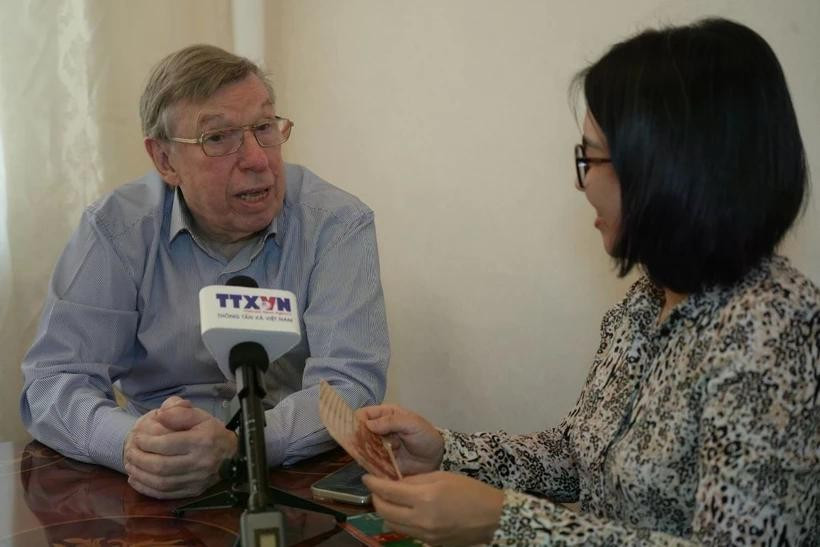
See more
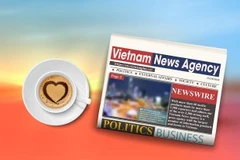
☀️ Morning digest on January 12
The following is a list of selected news summaries reported last weekend by the Vietnam News Agency.
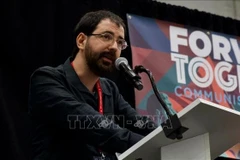
CPV's leadership - central factor shaping Vietnam’s enduring stability, impressive achievements: Israeli historian
Talgam said that from a comparative and historical perspective, the CPV’s leadership has been the central factor underpinning the country’s enduring political stability and impressive development trajectory. In a world marked by rapid and unpredictable changes, few political organisations have been able to maintain continuity of leadership while simultaneously adapting their governance approach as effectively as the CPV.
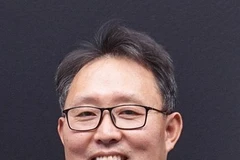
Korean expert expects turning point for Vietnam’s sustainable development
According to the professor, the most important strategic orientation to be defined by the 14th National Party Congress is a qualitative transformation of Vietnam’s growth model.
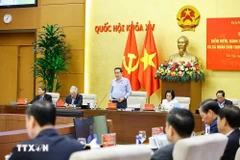
NA Standing Committee to convene 53rd session on January 12
The 53rd session of the National Assembly (NA) Standing Committee is scheduled to take place in Hanoi on the morning of January 12.

Prime Minister outlines five specific strategies for Government’s Party Committee
PM Chinh noted that the Government’s Party Committee exercised comprehensive leadership over the Government's operations, proactively and effectively responded to emerging issues, with a particular focus on socio-economic development. As a result, 2025 witnessed high economic growth, sustained macroeconomic stability and ensured major balances.

Government’s Party Committee reviews work in 2025, launches tasks for 2026
The establishment of the Government’s Party Committee was a major policy of the Party Central Committee, a step forward in the Party's leadership methods over the Government, strengthening the comprehensive and direct leadership of the Party over the Government's management and administration.

Resolution No. 66-NQ/TW and “renewal” of legal thinking
Party General Secretary To Lam has stressed that high-quality institutions and laws, aligned with practical development needs and the aspirations of the people, are the foremost factors determining a nation’s success.
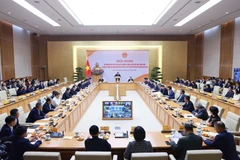
Economic diplomacy must be pursued with sincerity, balanced interests, shared risks: PM
The PM assessed that economic diplomacy in 2025 recorded important, transformative results, helping shift the situation and create new momentum for growth. From 2026 onward, Vietnam must strive for double-digit economic growth, which requires all sectors, levels, and localities to make greater efforts and generate stronger breakthroughs.
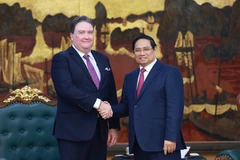
Vietnam wishes to continue strengthening Comprehensive Strategic Partnership with US: PM
PM Pham Minh Chinh proposed that the US strengthen cooperation with Vietnam in technology transfer and digital transformation, soon recognise its market economy status, and remove Vietnam from the lists of countries subject to restrictions on high-tech exports
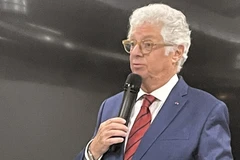
14th National Party Congress - pivotal moment for Vietnam to consolidate its rising position: former ambassador
Vietnam is expected to continue playing a very active role within ASEAN and to further strengthen its position as a genuine pillar of stability in Southeast Asia.

☕ Afternoon briefing on January 10
The following is a brief review of the day’s events as reported by the Vietnam News Agency.
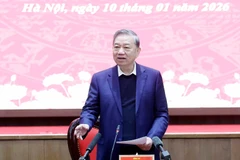
Strong legal framework needed for Hanoi’s development, innovation: Party chief
Hanoi’s new growth model must be closely linked to institutional reform, a significantly improved business environment, talent attraction and retention, the creation of growth hubs, innovation spaces, and ecosystems, thereby generating sustainable development momentum.
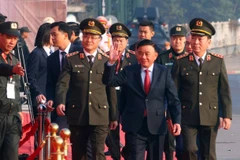
Security forces stage rehearsal for 14th National Party Congress
The People’s Public Security forces have been praised for their core role in closely working with the army and relevant ministries and agencies, with success in thwarting hostile plots at an early stage, drastically combating fake news and disinformation surrounding the 14th National Party Congress.
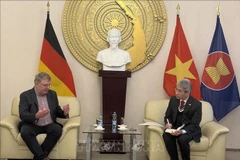
Leaders of German parties impressed by Vietnam’s achievements
Both sides underscored the importance of respecting the United Nations Charter and international law, and voiced opposition to the use of military force that undermines global peace and stability.
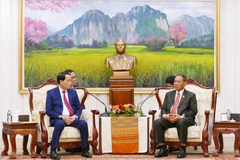
Deputy Minister of Public Security congratulates Lao officials following succesful 12th National Party Congress
Deputy Minister of Public Security Senior Lieutenant General Le Quoc Hungconveyed the warmest congratulations of the Central Public Security Party Committee, the Ministry of Public Security leadership, and the Vietnamese People’s Public Security Forces to Lakhamfong and other Lao public security leaders on the congress’s success and their election to key leadership positions for the new term.
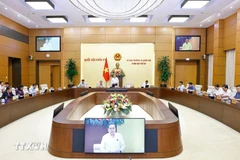
NA Standing Committee's key work agenda for 2026 approved
A major focus will be preparations for the election of deputies to the 16th NA and to People’s Councils at all levels for the 2026–2031 term. The NASC will coordinate with the National Election Council, the Government, the Vietnam Fatherland Front Central Committee, and relevant agencies and organisations to continue implementing the election plan, organise oversight of the electoral process, and carry out its duties and powers as prescribed.
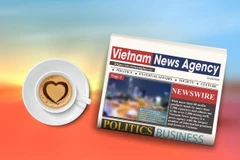
☀️ Morning digest on January 10
The following is a list of selected news summaries reported last night by the Vietnam News Agency.
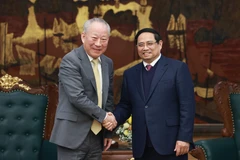
PM welcomes Chinese group’s expansion into major infrastructure projects
The PM welcomed the China Pacific Construction Group's proposals to join large-scale infrastructure developments in Vietnam in the coming years and encouraged more investment in the country.
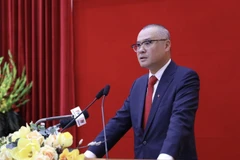
Pham Dai Duong named Secretary of Phu Tho provincial Party Committee
Pham Dai Duong pledged to continue dedication and work closely with the provincial Party Committee and the broader political system of Phu Tho in a spirit of unity and resolve to accomplish the tasks assigned to him.
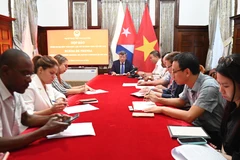
14th National Party Congress: Cuban journalists commend Vietnam’s development achievements
Vietnamese Ambassador Le Quang Long stressed that the 14th National Party Congress is an especially important political event, marking a pivotal milestone in Vietnam’s development in the new period.
